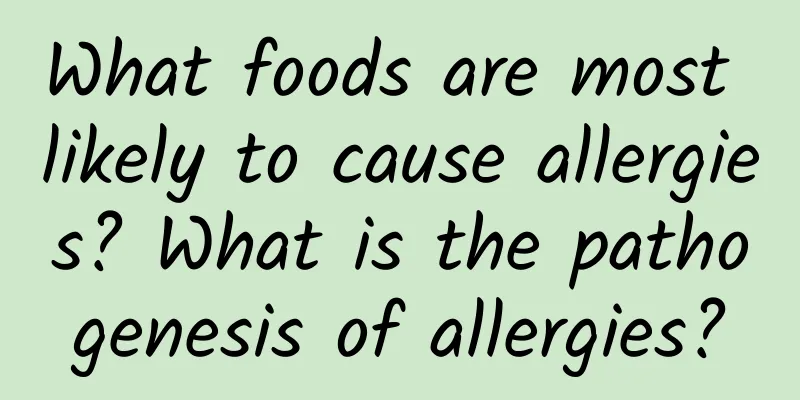What foods are most likely to cause allergies? What is the pathogenesis of allergies?

|
In recent years, more and more people have symptoms of food allergies. Experts point out that this is closely related to acquired factors, such as life stress, infection, diet structure, drugs, environmental pollution, etc. In particular, the increase in stress in modern life is an important cause of food allergies. So what are the foods that are likely to cause allergies? An article published in "Health World" in 2006 pointed out that half of allergies are caused by eggs. This conclusion was drawn by a bio-health technology company from Hong Kong[1]. They tested 96 foods most commonly eaten by Asians on 633 ordinary people aged between 8 months and 88 years old. The results showed that the most people were allergic to eggs and dairy products, such as milk and cheese. Among the allergic people, 54% and 46.6% were allergic to eggs and dairy products, respectively. 81% of the people experienced rashes and fatigue after allergies, more than 70% of the people caught a cold due to allergies, and other symptoms included flatulence and insomnia. In addition, the study found that kidney beans, bananas and sesame seeds are the foods most likely to cause allergies after eggs and dairy products. Experts point out that since food allergies are related to protein, theoretically, any food containing protein may cause allergies. Wheat, peanuts, soy sauce, nuts, fish and crustaceans are also common food allergens. So how do these foods cause allergies? Why do some people not have allergies while others do? In his 2004 book “Allergy and Antiallergic Drugs”, Professor Bian Zongpei of the Department of Dermatology at Ruijin Hospital affiliated to Shanghai Second Medical University mentioned that this is related to both genetic factors and allergic constitution[2]. In addition, the occurrence of allergic reactions also involves a process of repeated contact. For example, when a person with an allergic constitution comes into contact with the allergen antigen A for the first time, antibodies corresponding to the antigen will be produced in his body. This process is called sensitization. After sensitization, when he comes into contact with the A substance again, the human body will have an allergic reaction. The sensitization process can be fast or slow. For example, some people will have an allergic reaction after the second contact, while others will have an allergic reaction after multiple contacts. However, there are also very few people who will have an allergic reaction after the first contact. This is because cross-sensitization occurs in this process. Although the substances are different, the different substances contain the same antigenic structure that has been contacted before. Due to the allergic reaction occurring in the body, mast cells will rupture and release the true mediators mainly composed of histamine originally present in the mast cells, thereby triggering a series of pathological changes such as capillary dilation, increased vascular permeability, smooth muscle contraction, increased respiratory secretion and decreased blood pressure, causing symptoms such as skin erythema, wheals, asthma, abdominal pain and even shock. The symptoms of allergic reactions can be mild or severe. What foods a person is allergic to and what symptoms occur after the allergy have a lot to do with their individual constitution. Although the foods mentioned above are more likely to cause allergic reactions, you don't need to be overly nervous about them in life. The author of "Health World" mentioned that once food allergies occur in life, the most important thing is to find out what the allergens are. In addition, everyone must not panic, and must go to the hospital for diagnosis and treatment as soon as possible. Long-term delay may cause chronic degenerative diseases such as arthritis, depression, hypertension, dementia, diabetes, cancer, etc., and women are more likely to suffer from long-term infertility. References: [1] Tianshi. Which foods are most likely to cause allergies? [J]. Health World: Version B, 2006. [2] Bian Zongpei. Allergy and antiallergic drugs[J]. Chinese Pharmacy, 2004(5):88-90. |
>>: How can someone dare to say “I know this” when I made it up?!
Recommend
What is the physical condition of women who sweat easily?
Women's physique is not as strong as men'...
The new drug "Tondawi" for the treatment of triple-negative breast cancer has been approved. Why are these drugs called "biological missiles"?
The innovative drug "Tornavi" for the t...
Are your eyes red and itchy during the peak season of spring pollen? Beware of allergic conjunctivitis!
Do your eyes turn red and tear up when the spring...
It's not moldy cheese, it's the smoker's lungs
When I was young, I especially liked to visit the...
Symptoms of heavy bleeding after abortion
In this modern era where people's thoughts an...
Why do I have stomach pain but no menstruation?
Menstruation is something that every woman has to...
When fishing at night, do you fish at the bottom or float? What is the difference between fishing at the bottom and floating?
Should you fish bottom or float when fishing at n...
Why do you need pelvic repair?
After giving birth, many women undergo pelvic rep...
How many days does a woman's ovulation period last?
Many women are not clear about their ovulation pe...
Why are menstrual periods getting shorter?
Menstruation has a cycle in the female body. Gene...
Can I have IVF if I have ovarian cysts?
Ovarian cysts do have an impact on the ovaries, b...
About hypoglycemia
This is the 3217th article of Da Yi Xiao Hu Have ...
Can't comb your hair during confinement?
First of all, you can definitely comb your hair d...
What to do if you suddenly have amenorrhea
When a woman suddenly experiences amenorrhea, it ...
How late is the menstrual period?
Many women may have symptoms of early or delayed ...









